The Childhood Struggles of ISFJs
ISFJs are some of the most devoted, generous people you will ever meet. They have an innate sense of empathy and conscientiousness that makes them great listeners and incredible friends. As children, many ISFJs are some of the easiest, more obedient children because they have a strong desire to please their parents and tend to naturally respect authority and rules. However, behind their sweet-natured charm and quiet thoughtfulness, ISFJs can struggle with feeling alone, unappreciated, and overwhelmed as children. They tend to be constant givers and can sometimes be taken advantage of or taken for granted. I want to talk about the most common struggles for ISFJ children, and what can be done to help them if you’re parenting one yourself!
Table of contents
Estimated reading time: 12 minutes
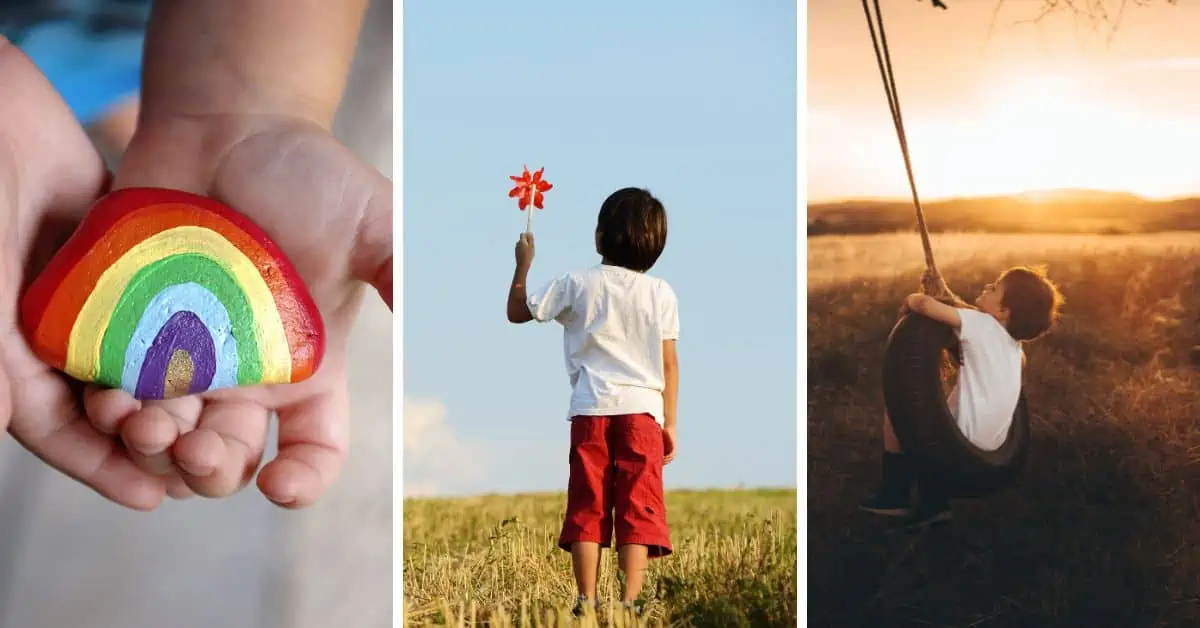
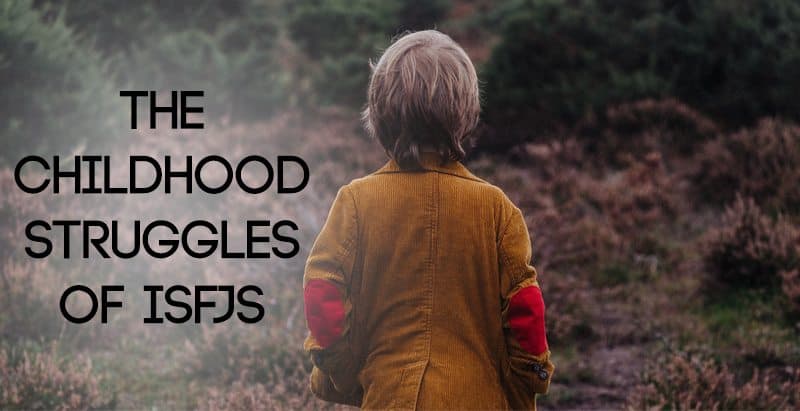
Want to know what your child’s type is? I have created a personality test to help you figure it out.
ISFJ Children and Sensitivity to Emotions and Criticism
ISFJ children are very aware of the emotions and moods of other people. Because they have auxiliary Extraverted Feeling (Fe) they can quickly pick up on even the most subtle changes in people’s moods. They despise conflict and will feel intense fear and distress if they are in an environment that is charged with anger or if they are exposed to bullying in any way. They also are very sensitive to criticism, taking it very personally and often beating themselves up over even the most minor mistakes. Parents who are more blunt and tactless can unintentionally hurt their young ISFJs feelings when they provide correction or criticism. Acceptance and family harmony are both vital ingredients in the home for a young ISFJ.
Keep in mind that this sensitivity to emotions and the strong empathy that ISFJs have is a strength to be appreciated. ISFJs can be incredible counselors, teachers, humanitarians, and activists. Rumor has it, after all, that Mother Teresa was an ISFJ.
ISFJ Children and Shyness
ISFJs are notoriously shy, and have a hard time approaching new people or starting at a new school. MBTI experts Paul D. Tiger and Barbara Barron-Tieger say this about ISFJs:
“ISFJs typically need more acclimatization time than children of other types and may not feel comfortable trying something the first time it is introduced to them, nor are they comfortable venturing into social settings immediately, often preferring to hang back or watch from the security of their parents’ laps.”
Paul D. Tieger and Barbara Barron-Tieger, Nurture by Nature
More extroverted parents should be careful that they don’t push their young ISFJ into heavy socialization or force them to venture out before they are ready. ISFJs desire to have the comfort of someone they know as they explore a new environment, and with a little help and encouragement, they will feel braver. Also keep in mind that ISFJs enjoy their time alone, and often prefer the company of just one or two close friends. Their social needs may be far different from extroverts’ social needs, and it’s important to understand that.
One thing that young ISFJs struggle with is a tendency to become embarrassed easily or cry easily. They are very private individuals, yet they care a lot about what others think of them. Jokes made at their expense, ridicule, or criticism is taken very hard by the young ISFJ. It’s important as a parent to try to give them plenty of encouragement and listen to them when they’ve had a negative experience, reassuring them of their value and worth.
ISFJ Children and Change

ISFJs like to know what to expect, and they love the comfort of home and the familiar. Because of their strong Introverted Sensing (Si) they have a fondness for things of the past, for memories, nostalgia, and reminiscing. They have a hard time moving to a new place, saying goodbye to an old home, to old friends, and venturing into a new environment can be extremely stressful for them. While intuitives are more future-oriented and open to change, and artisans (SP types) are more excited by change, ISFJs find change unsettling and stressful.
Paul D. Tiger and Barbara Barron-Tieger put it well in their book:
“Change can be particularly hard for school-aged ISFJs. They can freeze up in unpredictable situations or when quick changes are required. Many even say they actually hate change. Some ISFJs have such a high need for routine and structure that they can be uncooperative and resistant when others around them are adapting and enjoying themselves.”
Paul D. Tieger and Barbara Barron-Tieger, Nurture by Nature: Understand Your Child’s Personality Type and Become a Better Parent
Try to bring up changes gradually and with compassion as a parent of an ISFJ. Don’t expect them to just ‘roll with the punches’ as easily as some other types do. Try to prepare them, talk to them, give them time to adjust and come to terms with the change. If possible, give them lots of information about what to expect in a new situation and practical ways to be prepared. Try to remind them of how a new situation is similar to a past experience – ISFJs rely very much on their past experiences, and comparing the two can be comforting for them.
ISFJ Children and Overwhelming Emotions

Young ISFJs have a tendency to become overwhelmed by their profound emotions. They are very private individuals, but they have a very hard time hiding their emotions. They despise cruelty and injustice in the world, and can have very strong reactions to being hurt emotionally. They may cry, slam doors, kick walls, and even hold grudges for considerable lengths of time. Because ISFJs use Extraverted Feeling (Fe), they often have a hard time understanding and coping with their own emotions alone. While Introverted Feelers have a strong awareness of their own emotions, Extraverted Feelers have a strong awareness of others’ emotions. This makes it hard for ISFJs to sometimes manage their emotions as well as they want to. They may need to ‘vent’ or write out their feelings to understand them better.
If you’re a parent of an ISFJ, give them time to talk about their frustrations and feelings privately. It may take time for the ISFJ to truly open up about all their feelings, but they will appreciate your understanding and having someone who cares enough to listen. ISFJs are excellent listeners so they tend to hear a lot about other people’s problems, and have a harder time finding someone who will truly listen to and try to understand them in the same way.
ISFJ Children and Giving Too Much

ISFJs are extremely generous, devoted individuals. If you’ve ever read or watched Lord of the Rings, you probably remember a lovable character named Samwise Gamgee. He’s an excellent example of an ISFJ, and demonstrates how far they’re willing to go for those they love. There’s almost nothing they wouldn’t do to help out a friend or family member, and because of this, they can often be taken advantage of or be volunteered for too many responsibilities. Paired with this dilemma, they also have a hard time asking for help from anyone. They hate the idea of being a ‘burden’ and may go through life carrying the weight of the world on their shoulders because they are too eager to help, and simultaneously too determined to never ask for help.
Responsibility and following through on one’s word are both hallmarks of the ISFJ personality. However, sometimes they need a little help saying ‘no’ to people. They also need a parent to step in and notice when they’re getting overburdened, or taken advantage of. Teach them from an early age that it’s okay to say no to something they don’t want to do or don’t have time for. Try to help them and listen to them so that they can get a break from always being the listener, and always being the helper. Try to encourage them to find friends who give just as much as they receive, and who don’t prey on the young ISFJs kindness and generosity.
Discover the Ultimate ISFJ Owner’s Manual eCourse 🌟 A Journey of Self-Discovery for ISFJs
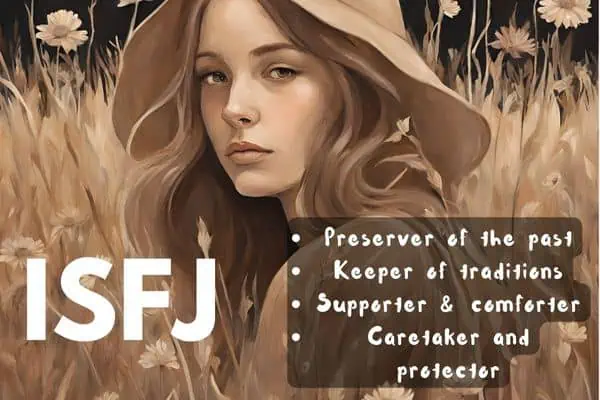
Are you an ISFJ looking to dive deep into the layers of your personality? Do daily stresses weigh you down or do you find yourself trapped in mental loops that hinder your tremendous potential? Introducing The ISFJ Owner’s Manual eCourse—your personalized blueprint for navigating life with clarity, balance, and joy.
Embrace a transformational experience with our Type Fundamentals Module, specifically curated to decode the essence of your identity. Discover the subtleties behind the four ISFJ subtypes, delve into cognitive functions, and face your challenges head-on with newfound understanding and grace.
Imagine achieving a state where every task flows naturally, effortlessly. Our Finding Flow Module is crafted to guide you towards your peak efficiency. Bid farewell to energy drainers and unlock doors to a life rich with ease and accomplishments.
Defensive patterns can often obstruct our growth. In the Overcoming Loops & Grips Module, we’ll explore the caverns of your mind to highlight and dismantle these barriers, empowering you to robustly defend your progress instead of your limitations.
With the FIRM Fixation Module, it’s time to conquer your most compelling compulsions. Gain perspectives on achieving harmony and control, propelling you towards a life of purpose and intent.
No growth journey is complete without a trusty toolbox. Our ISFJ-Specific Toolbox comes equipped with exercises and strategies that sit on a foundation of practicality and effectiveness. Tailored for ISFJ uniqueness, shatter obstacles and ascend to your personal zenith.
This eCourse doesn’t stop at just guiding you—it’s packed with rich-media resources including videos, audio recordings, PDF guides, and handouts designed to be your trusty companions as you march bravely into a self-aware future.
Exclusive Bonuses for Our ISFJ Explorers:
- Relationship Type-by-Type Comparison: Tread the intricate dance of relationships with guidance tailored to your ISFJ relationship style.
- “About Me” Guides: Craft sincerity in your romantic and business partnerships, resonating with the authenticity you deserve.
- How to Transcend Your Personality Type: Surpass the boundaries of type to embrace an unlimited version of you.
For the Kind, Compassionate Soul Who Deserves the Spotlight
You are the unsung hero—tirelessly giving to others, now it’s time for you. Understanding who you are, beyond what others need from you, is the most valuable gift you can afford yourself. The ISFJ Owner’s Manual eCourse is more than an investment in knowledge; it’s an investment in the heart of who you are.
With your ISFJ Owner’s Manual, not only will you be advancing your journey, but you’ll also be supporting a platform dedicated to psychological understanding and growth. As an affiliate partner with Personality Hacker, we believe in the power of this eCourse to transform your world. Your adventure to self-mastery begins now.
Unravel the msyteries of your ISFJ personality type with your ISFJ’s Owner’s Manual
This article contains affiliate links to books on Amazon or courses on Personality Hacker. If you purchase one of these books or courses, I get a small kickback that I can use to pay for hosting and other demands of this site. I only recommend books I love.
Find out more about your personality type in our eBooks, Discovering You: Unlocking the Power of Personality Type, The INFJ – Understanding the Mystic, and The INFP – Understanding the Dreamer. You can also connect with me via Facebook, Instagram, or Twitter!
What Do You Think?
Are you an ISFJ with any experiences or thoughts on these childhood struggles? Are you a parent of an ISFJ? I’d love to hear your thoughts and comments!
Want a complete course on your personality type? Personality Hacker has training and courses for each personality type, complete with webinars, a 14-page course, audio advice sessions and more here.
Sources:
Nurture by Nature: Understand Your Child’s Personality Type – And Become a Better Parent
Gifts Differing: Understanding Personality Type
MBTI Manual: A Guide to the Development and Use of the Myers-Briggs Type Indicator, 3rd Edition
My True Type: Clarifying Your Personality Type, Preferences & Functions
Neuroscience of Personality: Brain Savvy Insights for All Types of People
Type Talk: The 16 Personality Types That Determine How We Live, Love, and Work
Article: Personalities in Children & Family
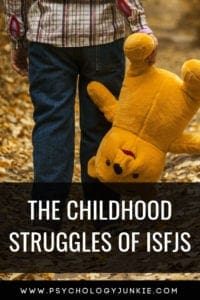
Get Your Free eBook!

Subscribe to our newsletter and get an eBook packed with powerful parenting tips for each personality type! Enjoy 28 beautifully illustrated pages exploring the needs and strengths of all 16 personality types in childhood.







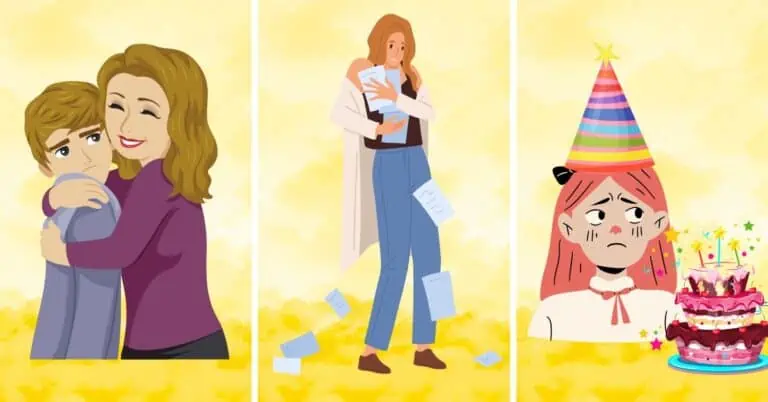
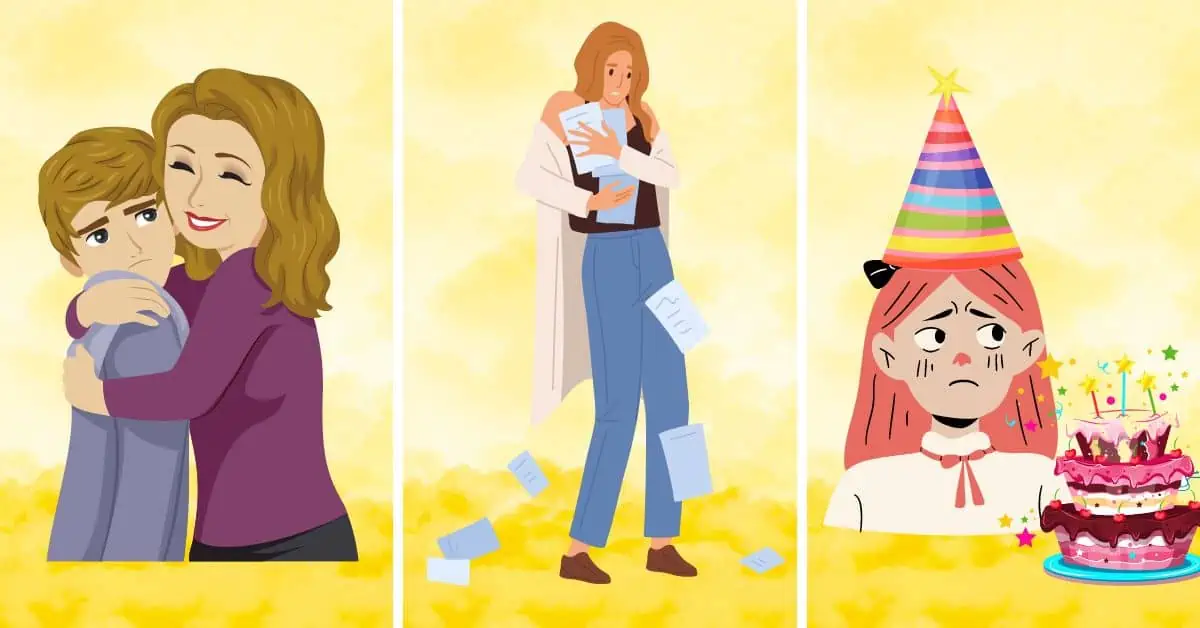
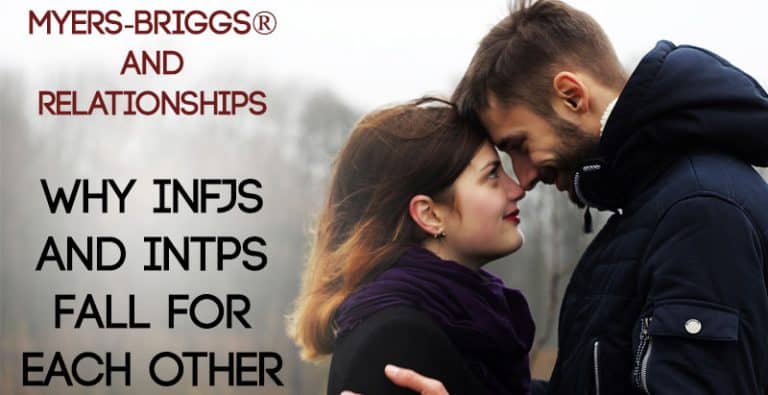


As ENFJ mother of a gorgeous ISFJ daughter, I wish I had read this earlier. I do many of the tips already, but I didn’t know about the fear of conflict and sensitivity to perceived criticism. I hope I haven’t hurt my girl too much. She too has a hard time letting stuff go because of the memories, she’s a little pack rat! And at most she has 5 very close friends. Its always at bedtime that she wants to do her sharing and catch up! She says it’s because I’m busy during the day. Thoughtful girl. I realise sometimes I must really overwhelm her. Im so glad for this information and hope I can be more responsive in a way that makes sense to her.
My isfj is 17. I just typed her this year. 🙁
wish I had known this long ago. The rest of us are intuitive types. This explains so much why she seems so overly sensitive to constructive criticism, any conflict & why she absolutely won’t ask for help ever!
However, she has far better boundaries than I do. She doesn’t hang onto friends that neglect her too many times.
As an INTJ mother of an ISFJ daughter, it was good for me to take my time to learn to communicate in the language of “feelings” LOL.. in my mind that´s how I look at it. Whenever I would try to teach her an abstract concept like “justice”, I had to refrase it/translate it into how people feel about certain actions, how she would feel, how God would feel.. I personally wouldnt´ had like it as a child because it would seem manipulative and I still sometimes struggle with that idea, but that is the only way she understands it, and of course, once she connects the concept with her emotions she never forgets.
I am an isfj and this described my child hood very well.
I’m an isfj…i had a hard time resigning from my job because my supervisor pleaded and told me to stay until the company hires more staff, i agreed to stay coz i wanted to help and considered my colleagues as my family as well. Then, my sister noticed that i became irritated and depressed because of my eratic work schedule , I often work overtime and sleep less. My mom and sister eventually encouraged me to resign and said to me that it is not my problem that the company is understaffed and i should think about myself sometimes, btw i was also offered with a good deal by another bigger and better company, so it made my descision to resign easier.
Oh how I wish I saw this when I was a child. I always thought that if someone picked on me, that I did something wrong. I always felt like an outsider and had a few close friends. Thank you for posting this and validating my feelings and experiences as a child.
It confirms I’m really an ISFJ. It’s 100% my childhood struggle. Thanks for writing this article!